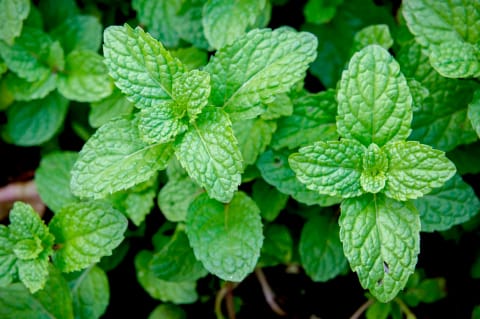Advertisement
Peppermint Oil: This Remedy May Ease Your Headaches, IBS & Nasal Congestion



The fresh and invigorating zing of peppermint may be most commonly praised in chewing gum commercials, but there's much more to this ancient herb than minty fresh breath. Peppermint, and more specifically peppermint oil, has long been used for both its medicinal and cosmetic properties.
When it comes to herbal dietary supplements that pack a punch, peppermint is high on the list. If you've heard about the health benefits of peppermint oil and are curious about whether it's worth exploring, you're in the right place.
"Peppermint oil can help migraines, muscle tension, cold symptoms and coughs, and more," says Taz Bhatia, M.D., integrative medicine physician and mbg Collective member. "The leaves contain menthol and the oils can have many vitamins and nutrients including magnesium, potassium, and vitamins A and C."
Here, learn all about peppermint oil's benefits, side effects, and how to use it for various ailments.
The history of peppermint oil
Peppermint is an ancient herb native to the Mediterranean whose health benefits can be traced back to Japanese and Chinese folklore. Dating back to 1000 BCE, dried peppermint leaves were even found in ancient period tombs in Egypt.
Also known by its botanical name, "Mentha piperita" has serrated green leaves and light purple flowers. It's used in an abundance of hygiene, cosmetic, medicinal, and aromatherapy products and is one of over 25 herbs considered to be in the "mint" family (think: spearmint, water mint, etc.). It first appeared in pharmacy documentation in 1721 in the London Pharmacopoeia. Needless to say, the history of peppermint isn't as fresh as its minty taste and fragrance—it's been on the scene for quite a while.
Health benefits of peppermint oil.
It may ease irritable bowel syndrome (IBS).
You've probably heard that sipping on peppermint tea or sucking on a peppermint candy can help settle an upset tummy. But did you know that scientific research has shown that it's effective in treating irritable bowel syndrome?
One study1 that gauged the efficacy of peppermint oil (in sustained release capsules) on IBS found that it eased symptoms by 40 percent over the course of four weeks, compared to 24 percent in the placebo group. Even more impressive, a review of nine scientific studies2 concluded that patients with IBS who took peppermint oil for two weeks fared better than patients receiving a placebo treatment. Peppermint has been shown to relax digestive system3 muscles and decrease pain and cramping, which could make it a useful remedy for people with the occasional bloating, gas, or upset stomach.
In addition to taking coated peppermint oil capsules, Dr. Bhatia says 1 to 2 drops of peppermint oil, mixed with a glass of water can be taken orally. You can also massage a few drops of peppermint oil (combined with a carrier oil) directly onto the abdomen.
It may soothe tension headaches.
The World Health Organization estimates that about 50 percent of people4 in the United States have experienced a headache in the past 12 months. Tension headaches are the most common type of headache and are noted by discomfort in the head, scalp, or neck. More often than not, it's a result of muscle tightness in these areas.
Peppermint, however, is here to help due to its ability to help relax muscles. It has even been shown to beat out powerful pharmaceuticals when it comes to headache relief. One study5, in which a peppermint oil solution was spread across the forehead and temples, found that peppermint was as effective as taking 1,000 mg of oral acetaminophen. Pretty impressive for a bushy green plant.
Pro tip: Combine a few drops of peppermint oil with a carrier oil in a rollerball bottle. When headaches strike, simply roll it across your forehead and temples and rub in for relief!

It may help combat the common cold.
You know that feeling in your nostrils when you take a whiff of something minty? That sharp, fresh rush that feels like a cool breeze blowing through your nose? That feeling is where peppermint's cold-kicking properties lie. Research6 has shown that the aromatic compounds in peppermint oil can help clear clogged sinuses associated with the common cold and sinus infections.
One of the active compounds in peppermint that you're likely already familiar with is menthol. Studies3 have indicated that the menthol in peppermint can create the perception of cleared nasal passages, even if it isn't actually clearing them. Sometimes that perceived feeling of relief can be all you need to get a good night's sleep.
Diffusing a few drops of peppermint oil in your essential oil diffuser (or breathing it in via a bowl of steamy water) is a great way to reap the sinus-clearing perks of this potent herb. Its antimicrobial properties7 may even help purify indoor air.
It may promote healthy hair.
Peppermint is a popular ingredient in hygiene products like shampoo, and it may have benefits beyond that invigorating clean feeling it provides. One study8 on mice found that application of a 3 percent peppermint oil solution was more effective in treating hair loss than a traditional, FDA-approved hair growth product called minoxidil. Other research9 has shown that, in general, menthol can help increase blood circulation, which may stimulate hair growth. Additionally, some research suggests that peppermint oil is a viable natural lice treatment.
For use on hair, combine a few drops of peppermint oil with a carrier oil and massage into the scalp (you can then rinse, or cover your hair with a shower cap and leave it on overnight), or add a few drops to your shampoo.
What's a safe peppermint oil dosage?
When it comes to dosing peppermint oil, it depends on what your intended use is. For IBS, most research has shown ingesting the following dosages in the form of capsules can ease symptoms:
- Adults: 0.2 to 0.4 mL of oil, 3 times daily in coated capsules
- Children: 0.1 to 0.2 mL of oil, 3 times daily in coated capsules
When using peppermint topically, it's very important to dilute it in a carrier oil. Carrier oil options range from coconut oil to almond oil to jojoba oil, but we recommend you choose your personal favorite. Dilution instructions are as follows:
- 2 to 3 drops of peppermint oil to every 1 teaspoon of carrier oil (for a 2 percent dilution)
Are there any peppermint oil side effects?
As with any new addition to your health and beauty routine, it's important to be aware of potential side effects. Fortunately, it's unusual for peppermint oil to cause adverse effects when taken appropriately. Some reported side effects include allergic reaction, heartburn, and blurred vision (keep it away from your eyes!). Talk to your doctor before using peppermint oil to treat any specific condition and if you notice anything unusual after taking peppermint oil.
Where can you buy peppermint oil?
Peppermint oil can be found anywhere essential oils are sold (Whole Foods Market, health food stores, pharmacies, etc.), as well as online. Amazon offers several brands with customer reviews and ratings to help you find the right option for you.
The type (and quality) of the peppermint oil you should buy also depends on how you plan to use it. For example, you may want to opt for an organic peppermint oil, or peppermint oil capsules, if you plan to consume it, while you may feel this is less necessary if you plan to diffuse it.
9 Sources
- https://www.ncbi.nlm.nih.gov/pubmed/26319955
- https://www.ncbi.nlm.nih.gov/pubmed/24100754
- https://www.ncbi.nlm.nih.gov/pubmed/16767798
- https://www.who.int/news-room/fact-sheets/detail/headache-disorders
- https://www.ncbi.nlm.nih.gov/pubmed/8805113
- https://www.ncbi.nlm.nih.gov/pubmed/19039907
- https://www.ncbi.nlm.nih.gov/pubmed/8893526
- https://www.ncbi.nlm.nih.gov/pmc/articles/PMC4289931/
- https://www.sciencedirect.com/science/article/abs/pii/S0026286216300401?via%3Dihub
Watch Next
Enjoy some of our favorite clips from classes
Enjoy some of our favorite clips from classes
What Is Meditation?
Mindfulness/Spirituality | Light Watkins
Box Breathing
Mindfulness/Spirituality | Gwen Dittmar
What Breathwork Can Address
Mindfulness/Spirituality | Gwen Dittmar
The 8 Limbs of Yoga - What is Asana?
Yoga | Caley Alyssa
Two Standing Postures to Open Up Tight Hips
Yoga | Caley Alyssa
How Plants Can Optimize Athletic Performance
Nutrition | Rich Roll
What to Eat Before a Workout
Nutrition | Rich Roll
How Ayurveda Helps Us Navigate Modern Life
Nutrition | Sahara Rose
Messages About Love & Relationships
Love & Relationships | Esther Perel
Love Languages
Love & Relationships | Esther Perel
What Is Meditation?
Box Breathing
What Breathwork Can Address
The 8 Limbs of Yoga - What is Asana?
Two Standing Postures to Open Up Tight Hips
How Plants Can Optimize Athletic Performance
What to Eat Before a Workout
How Ayurveda Helps Us Navigate Modern Life
Messages About Love & Relationships
Love Languages
Advertisement

What Men Are Getting Wrong About Mental Health, From A Psychologist
Stephen B. Poulter, PhD

Your Grandma's Go-To Supplement Is Once Again Popular (For A Good Reason)
Molly Knudsen, M.S., RDN

What Men Are Getting Wrong About Mental Health, From A Psychologist
Stephen B. Poulter, PhD

Your Grandma's Go-To Supplement Is Once Again Popular (For A Good Reason)
Molly Knudsen, M.S., RDN













